South Africa
Polls closed in South Africa’s May 8 polls at 21:00 local time. Attention has now turned to the tallying and announcement of results from across the country.
Voters elected lawmakers in a process that will ultimately lead to the choosing of a president by the next National Assembly. The ruling ANC as widely expected have taken a strong lead with the DA and EFF trailing.
The vote is the sixth since the end of apartheid in 1994 and the adoption of democracy. On the same day there will be elections for provincial legislatures across the country.
South Africa has nine provinces which are: Limpopo, Guateng, Free State, Northern Cape, Eastern Cape, Western Cape, Kwa-Zulu Natal, North West and Mpumalanga provinces.
This “SA elections hub” is part of our Africa Elections coverage of the election on-ground with our correspondent Daniel Mumbere and also on our different social media platforms.
The following areas are treated as you scroll down:
- EFF biggest winners in legislative figures
- ANC maintains firm lead, EFF hits a million and half votes
- Polls close, results collation starts
- Final push to close of polls
- Voters share inked thumbs on social media
- Race inspired queues at voting stations
- Main aspirants cast their ballots – all upbeat
- Photos from across voting centers
Visit our ‘Africa Elections’ page for more on the May 8 vote May 11: Final results
- Voting Districts Captured: 22 925 of 22 925
- Total Valid Votes: 17 436 144
- Spoilt Votes: 235 472
- Total Votes Cast: 17 671 616
- Voter Turnout: 65.99 %
- Registered Population: 26 779 025
May 11: Top 5 parties after 100% of voting districts counted
- ANC: 10 026 475 votes representing 57.50%
- DA: 3 621 188 votes representing 20.77%
- EFF: 1 881 521 votes representing 10.79%
- IFP: 588 839 representing 3.38%
- VF PLUS: 414 864 representing 2.38%
May 11: Record 14 parties grab seats in parliament
Fourteen parties are set to take seats in South Africa’s next National Assembly. The ruling ANC maintained their huge lead with over half of the seats.
The ANC, however, saw a drop in its votes and seats as did the main opposition Democratic Alliance, DA. DA have 84 seats down from 89 whiles the EFF became the biggest winner in the process.
EFF’s seats went up by nineteen seats, incidentally the same loss to the ANC. The DA dropped by 5 seats. Three new parties – ATM (2), GOOD (2) and Al-Jama (1) secured seats.
ANC is the only party with three-digit figures (230), four parties have double-figure representation DA (84), EFF (44), IFP (14) and VP Plus (10). The ACDP has four seats whiles six others have two seats each. Al Jama party and PAC have a seat each.
Net EFF gain= Net ANC loss
Trend matters..Seats in the NA. (Change in brackets).
ANC: 230 (-19)
DA: 84 (-5)
EFF: 44 (19)
IFP: 14 (+4)
FF: 10 (+6)
ACDP: 4 (+1)
NFP: 2 (-4)
UDM: 2 (-2)
COPE: 2 (-1)
AIC: 2 (-1)
ATM: 2 (new)
GOOD: 2 (new)
PAC: 1 (no change)
Al Jama-ah: 1 (new)— DICKSON MAGECHA (@Dicksonmagecha) May 12, 2019
May 10: ANC approaching 58% mark with 95% of results out
NATIONAL ELECTIONS RESULTS
At 94,91% votes counted, the #ANCLeads
Check the IEC website for more results #PhakamaRamaphosa pic.twitter.com/t2nBMyoeg8
— #VoteANC (@MYANC) May 10, 2019
May 10: Top 5 parties with 90.2% of voting districts counted
- ANC: Over 8 450 000 votes representing 57.38%
- DA: Over 3 094 000 votes representing 21.01%
- EFF: Over 1 521 000 votes representing 10.33%
- IFP: Over 522 000 representing 3.55%
- VF PLUS: Over 347 000 representing 2.36%
The EFF has finally hit the one-and-half million vote mark. The ANC (closing in on 8.5 million) and the DA which is inching towards goes past the three million mark.
May 10: Ruling ANC maintains strong lead hoping to hit 60%
Results Capturing Progress: 92.81 %
Voting Districts Captured: 21 276 of 22 925
Total Valid Votes: 15 331 202
Spoilt Votes: 211 917
Total Votes Cast: 15 543 119
Voter Turnout: 65.59 %
Registered Population: 26 779 025
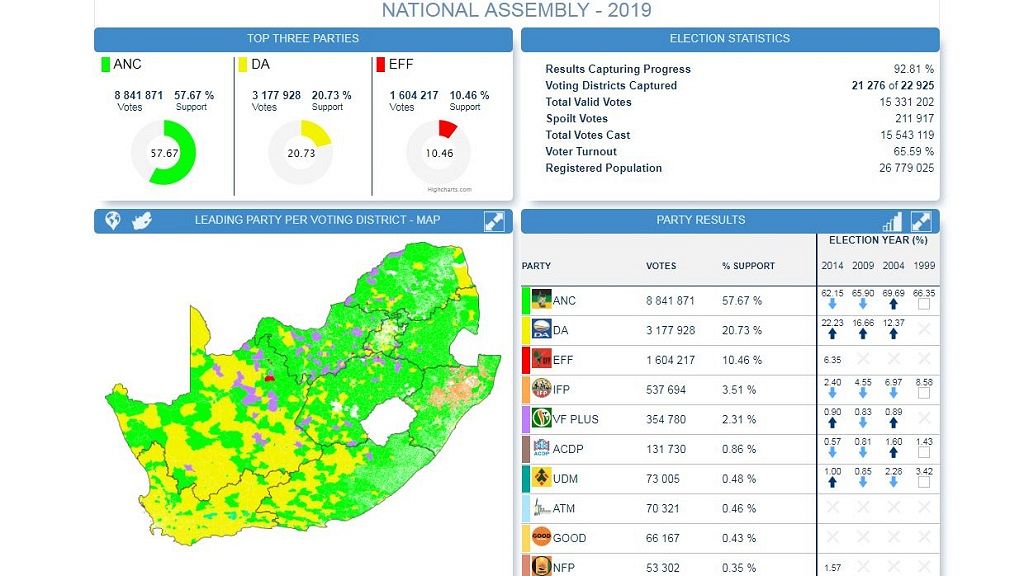
May 9: Top 5 parties with 70.15% of voting districts counted
- ANC: Over 6 271 000 votes representing 56.62%
- DA: Over 2 490 000 votes representing 22.48%
- EFF: Over 1 094 000 votes representing 9.88%
- IFP: Over 318 000 representing 2.88%
- VF PLUS: Over 282 000 representing 2.55%
The EFF has surpassed the one million vote mark even though it is a mile behind the ANC (cloing in on 6 million) and the DA which is inching towards the 2.5 million mark.
May 9: Ruling ANC takes expected lead with 70% of votes collated
Status (Voting districts counted): 16 082 of 22 925 voting districts counted
Total Valid Votes: 11 million plus
Spoilt Votes: 152 840
Total Votes Cast: 11.2 million plus
Voter Turnout: 65.39 %
Registered Population: 26 756 649
May 9: IEC Official Updates
- Provinces with the most results still awaiting capture were KwaZulu-Natal (44.84% outstanding), Limpopo (43.18% outstanding), Free State (33.62% outstanding) and Gauteng (30.86% outstanding).
- Leading the way in capturing results was the NCape where 94.48% of results had been captured followed by the WCape (89.8%), ECape (85.1%), Mpumalanga (79.96%) & North West (75.47%).
- Of 8.9m votes captured, 329 936 (3.70%) were special votes & 120 172 (1.35%) spoilt ballots. Based on results captured to date, voter turnout was 65.36% nationally, with highest turnout in Gauteng (71.88%) & lowest in Limpopo (58.37%).
- As at 18h30 (local time) today the Electoral Commission had finalised the results from 13 731 of the 22 924 voting stations (59.89%) totalling 8.9m votes. Results from a further 2 577 voting stations had been captured and were awaiting audit & finalisation.
- The election body will urgently conduct an audit of results and votes cast in a sample of voting stations to ascertain if double voting occurred. A number of multiple voters were arrested today.
We celebrate #AfricaMonth because it brings us together with fellow brothers and sisters from across the continent to forge greater unity. It’s an opportunity for all of us to better understand each other as Africans both on the continent and in the diaspora. pic.twitter.com/pNHVyXl07f
— South African Government (@GovernmentZA) May 9, 2019
#SAElections2019: As SA's #ElectionResults continue to trickle in, here's a look at the voter turnout in the last 3 elections:
2009 – 77.3%
2014 – 73.4%
2019 – 65.4%Tune in on #CNBCAfrica DStv 410 at 16:30 CAT as we continue our post election analysis coverage. pic.twitter.com/cLD5BrzKPC
— CNBC Africa (@cnbcafrica) May 9, 2019
Rundown: Africanews report on May 8 vote
.embed-container { position: relative; padding-bottom: 56.25%; height: 0; overflow: hidden; max-width: 100%; } .embed-container iframe, .embed-container object, .embed-container embed { position: absolute; top: 0; left: 0; width: 100%; height: 100%; }
Polls close, attention turns to results tallying
Africanews’ correspondent in South Africa confirms the close of polls in the May 8 vote. Attention now turns to the tallying and collation of votes across the country.
The IEC headquarters is filling up with party representatives and officials who are expected to undertake the task of pooling results and publishing same.
The IEC during the last local polls posted results in real time on a dedicated web page and via their mobile app. They had expressed readiness for today in the run-up to the vote.
It's time to crunch numbers and celebrate/concede, as voting closes and tallying commences here in #SouthAfrica.
Look out for updates on #TheMorningCall
africanewsafricanewsfr https://t.co/xbutp5SHoD— #thathashtagguy ???? (@danmumbere) May 8, 2019
What happens at the results collation center?
[WATCH] Have you ever wondered what happens at the
iecsouthafricaResults Centre? skhumbi takes you on a tour with theIECSouthAfricaspokesperson KateBapela. #SAElections2019 #2019ElectionsOnKaya pic.twitter.com/FsnH067i1g— Kaya FM 95.9 (@kayafm95dot9) May 8, 2019
President sends final push tweet, IEC warns ‘fraudsters’
President Ramaphosa makes final call to voters to ensure that their votes will count. His tweet came exactly an hour to the close of polls which is at 21:00 local time. The EFF leader also made a similar call.
“You only have 1 hour left until the voting stations close tonight at 21h00. We urge you to get to your voting station & please remember – as long as you are in the queue to vote at closing time at 9pm, you have a right to vote. Every single vote counts,” Ramaphosa’s tweet read.
The main opposition DA on its part tweeted two-hours to the close of polls with a declaration that the vote was neck-and-neck between DA and ANC. How they arrived at that……
Meanwhile the elections body, IEC, also cautioned persons who were scheming to tamper with the integrity of the polls.
We wish to remind all voters that any attempt to undermine the integrity of the #SAElections2019 election process – including remove the ink mark and voting more than once – constitutes electoral fraud and is punishable by up to 10 years in jail.
— IEC South Africa (@IECSouthAfrica) May 8, 2019
MUST WATCH: In the final HOUR before Voting Stations close across the country, the CIC Julius Malema urges all South Africans who have not yet voted to come out in their numbers and vote. #OneHourLeftToVote pic.twitter.com/aJiqBGC6cr
— Economic Freedom Fighters (@EFFSouthAfrica) May 8, 2019
With only two hours to go!
Are you happy with the direction South Africa is headed in?
Millions have already come out to cast their vote. Don't waste your ONE opportunity to make your voice heard.
Vote
#2019Elections pic.twitter.com/wR8FiaWuQ8
— Mmusi Maimane (@MmusiMaimane) May 8, 2019
Ticked thumbs all over SA social media
Whiles in parts of Africa, a finger of the voter is virtually dipped into indelible ink, it is a simple process over in South Africa.
A simple ink mark on the left thumb seems to be all that is required to identify a voter. Most voters have been sharing a sign that they had actually cast their ballots.
The elections body, IEC, had earlier reiterated the offense relating to sharing once vote on social media. They encouraged voters to rather share their ticked thumbs.
It is a criminal offence to reveal how you or someone else has voted by posting a marked ballot. If found guilty of this offence, you could face a fine or up to a year in jail. Please respect the electoral law of this country and remove your tweet.
— IEC South Africa (@IECSouthAfrica) May 8, 2019
Hubby and I just voted. Vote guys, stations open till 9pm
— Marshni Padayachee (MrsMarshniP) May 8, 2019IECSouthAfrica#SAElections2019 #XseDay pic.twitter.com/3gk0XluQKK
Waited for an hour and a half but no hiccups and the IEC staff were all friendly. Well done
— Like ‘Chow’ ???? (mingcheau) May 8, 2019IECSouthAfrica#SAElection2019 pic.twitter.com/UrPdnMI0K5
— Peter carragher (Petercarragher5) May 8, 2019
IECSouthAfricaMy wife and I..and our two daughters for the first time pic.twitter.com/xONdXppQuI
Manicure and all. Voted. pic.twitter.com/xfIZN3rg7G
— Thobile Dlamini?? (@the_real_tdlams) May 8, 2019
Voting queues on basis of race
In a country that remains polarized on the basis of race, the issue popped up in areas across the country where queues were formed on the basis of race.
A Twitter user shared a video clip from Cape Town Wellington where black and white voters formed different queues with the singular aim of casting their ballots.
This is the current situation at Cape Town Wellington, I'm so amazed and disgusted #SAElections2019 pic.twitter.com/Daejy6yJ5M
— Aphelele majova (@ApheleleMajoba) May 8, 2019
The elections body in a tweet on the issue said: “Thanks for bringing this to our attention. Please advise the name of the voting station asap.” It remains to be known under which laws they were going to act.
Please provide voting station details and time of video so we can investigate asap.
— IEC South Africa (@IECSouthAfrica) May 8, 2019
The following areas are treated as you scroll down:
- The main issues underlying the vote
- Some top facts surrounding the vote
- History of the vote
- Special, diaspora voting
- Three main parties in the race
- The main candidates
- Voting process
- The election organizing body
Main aspirants cast their ballots
President Ramaphosa casts his ballot, says he’s “excitingly confident”
Leaders of the three main parties have cast their ballots with each saying they were upbeat of victory at the end of the day. The three are President Cyril Ramaphosa, ANC; Julius Malema, EFF; and Mmusi Maimane, DA.
The president said he was “truly humbled” by the turnout stressing that the message was clear that South Africans want to see a country that is working and officials who will work for them.
He admitted that at a point, “corruption got into the way” of serving the people and he apologized. He said he was “excitingly confident.”
Ramaphosa said the outcome of today’s vote will be a major boost for investors reiterating the ANC’s campaign pledge to fight inequality vigorously under his administration.
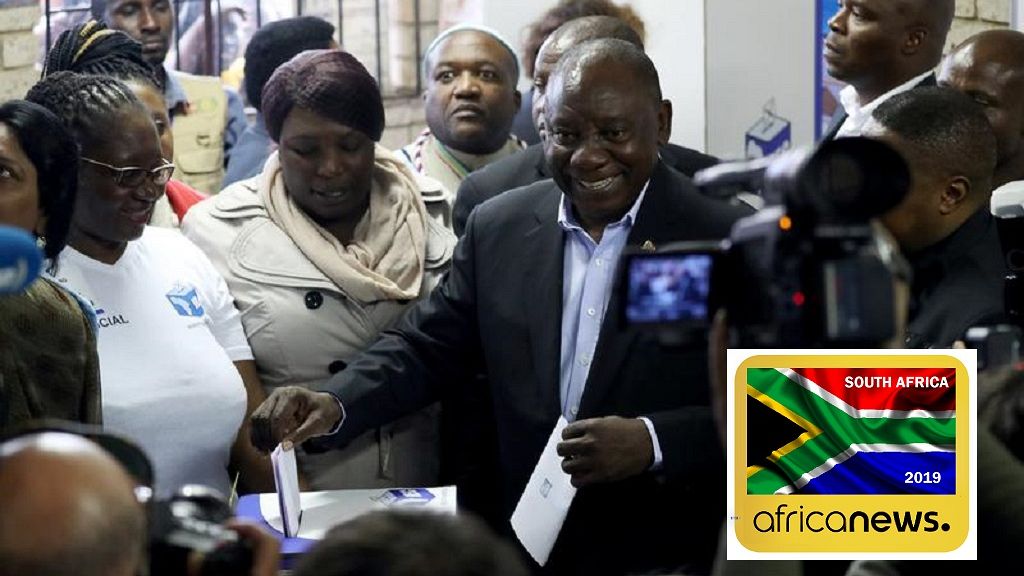
#SADecides2019 #SAElections2019pic.twitter.com/JuimLfWxir
— Aly-Khan Satchu (alykhansatchu) May 8, 2019
18-DEC-2017 :: Will it be 1994 all over again?TheStarKenyahttps://t.co/euxBPLzea7
We can all remember the moment when Nelson Mandela came out of prison, blinking in the sunlight
Main opposition chief Mmusi Maimane votes in Soweto
The leader of South Africa’s main opposition party has cast his ballot in Dobsonville, a part of Soweto, Johannesburg’s largest black township. He was one of the first voters at the Dobsonville polling station.
Democratic Alliance leader Mmusi Maimane has vigorously campaigned against the corruption scandals that have tarnished the ruling African National Congress party. But black support for Maimane’s party is limited because it is widely perceived as being run by whites.
The African National Congress, the party of Nelson Mandela that has been in power since 1994, is likely to win a majority in Wednesday’s poll but it will face a difficult challenge to do as well as five years ago.
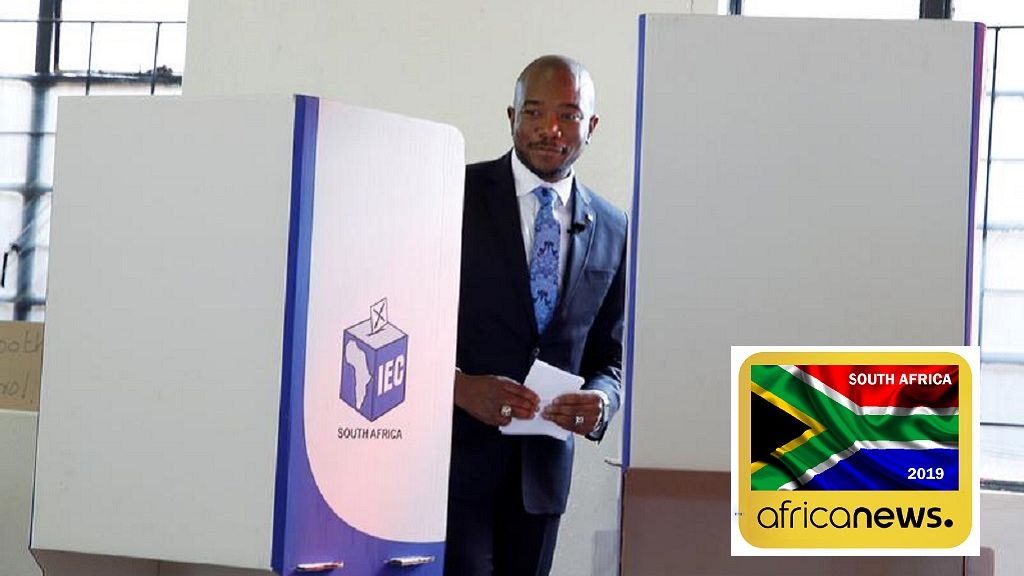
EFF leader Malema says his party represents best route for radical reforms
Third-force opposition leader Julius Malema voted in in his home area of Seshego, part of Polokwane in northern Limpopo province.
Speaking after casting his ballot, Malema said he expects a good turnout for his party, the populist, leftist Economic Freedom Fighters.
“If the people want to continue unemployed, if the people want to continue landless, then they can continue voting for the same party,” said Malema, referring to the ruling ANC, in power since 1994. “But if you need change, the EFF is the way to go!”
Malema said his joy at seeing South Africans voting 25 years after the end of apartheid, was because “a lot of people died for to have the right to vote.”
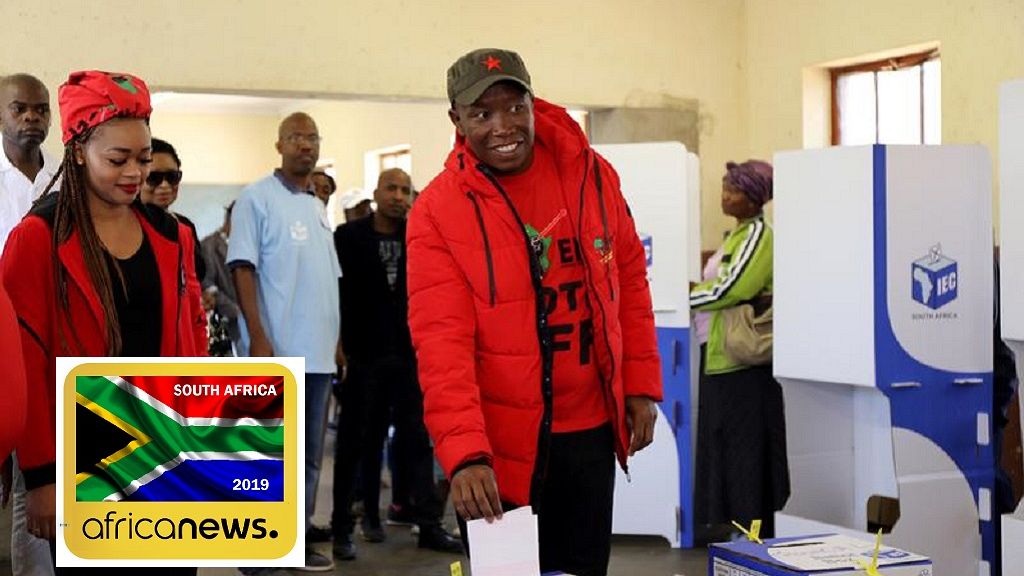
Photos from voting centers across the country
? [Photos] ? South Africans vote in general election
Polls open in #SouthAfrica as voters elect lawmakers in a process that will ultimately lead to the choosing of a president by the next National Assembly. #SouthAfricaDecides2019 https://t.co/fV4DWRlQbT pic.twitter.com/HgimTsCp3W
— africanews (@africanews) May 8, 2019
The vote is the sixth since the end of apartheid in 1994 and the adoption of democracy.#SouthAfricaDecides2019 pic.twitter.com/nK5DjfMt8h
— africanews (@africanews) May 8, 2019
There are 48 parties to choose from — more than at any election since the end of white minority rule in 1994.#SouthAfricaDecides2019 pic.twitter.com/qWf4cxyQVj
— africanews (@africanews) May 8, 2019
The main issues underlying the vote
There are a number of issues likely to weigh strongly on today’s vote according to political and elections analysts: The land question and housing, corruption, education and jobs.
The issue of land has been topical through the years but more prominently this year when the expropriation of land engaged lawmakers in fierce exchanges.
As it stands now, the parliament voted to expropriate land without compensation with the ruling ANC and leftist EFF voting strongly in favour whiles the main opposition DA rejected the motion.
South Africa, one of the continent’s most industrialized nations, continues to suffer the scourge of corruption which was key in the move to oust former president Jacob Zuma ahead of the polls. There is currently a commission looking into high-level corruption under the Zuma administration.
Unemployment has been an issue which President Ramaphosa has pledged to actively combat in his first substantive term if the ANC gets the mandate to continue.
The housing question as South Africans prepare to vote Top facts surrounding the polls
- The president is leader of the party with majority in parliament, himself a parliamentarian
- The South African consitution allows a candidate a maximum of two five-year terms.
- A record 48 parties are contesting in the national parliamentary election. 19 more parties than 2004.
- The Northern Cape has lowest number of provincial parties (21) and Gauteng has the highest (36).
- The organizing body is the Electoral Commission of South Africa, IEC.
- In South Africa, voters are to make an ‘x’ sign in a box close to their preferred party.
ANC promises to combat corruption; EFF talks radical reforms Background to the vote
There are 48 parties to choose from — more than at any election since the end of white minority rule in 1994.
The African National Congress (ANC) has won every parliamentary election since 1994, and opinion polls predict it will again win a majority of the 400 seats in the National Assembly, the lower house of parliament.
But President Cyril Ramaphosa is under pressure to reverse a slide in support for the ANC, which has seen its share of the parliamentary vote drop from a high of more than 69 percent in 2004 to 62 percent in 2014.
The ANC’s biggest rivals this time are main opposition party the Democratic Alliance (DA) and the Economic Freedom Fighters (EFF), a radical leftist group.
Parliamentary and provincial elections happen every five years, with seats allocated according to a proportional representation system.
Background to South Africa’s sixth post-apartheid vote Video: Special and diaspora voting:
Around 770, 000 South Africans were expected to cast their special vote between yesterday Monday and Tuesday (May 6 – 7), an opportunity that was approved by the electoral body to enable those who may be unable to cast their ballot on election day.
Preceding the special voting, people in the diaspora had been availed the opportunity to cast their ballots a week ahead of the main process back home.
South Africa is one of few African countries that allow registered citizens to express their democratic rights. Kenya and Rwanda also make provisions for same during their presidential polls.
Our reporter on the ground, Daniel Mumbere, gave a rundown of the process of special voting on The Morning Call.
.embed-container { position: relative; padding-bottom: 56.25%; height: 0; overflow: hidden; max-width: 100%; } .embed-container iframe, .embed-container object, .embed-container embed { position: absolute; top: 0; left: 0; width: 100%; height: 100%; }
The main parties and their respective leaders:
- Ruling AFRICAN NATIONAL CONGRESS, ANC
The ANC swept to power in 1994 under liberation hero Nelson Mandela, who became South Africa’s first black president after leading the fight against the brutal apartheid regime.
It has been the majority party in the National Assembly for the past 25 years and currently governs every province apart from the Western Cape.
Many black South Africans grew up associating the ANC with their dream of a country free from racial segregation and with equal access to jobs and education.
Although the ANC has achieved important successes by providing formal housing and basic services like electricity to many black families for the first time, the scale of the problems it inherited means change has been slow and many people today are impatient for more.
Under its previous leader, former president Jacob Zuma, whom the ANC ousted in February last year, a string of scandals involving corruption and gross maladministration seriously tarnished the party’s image. Zuma denies any wrongdoing.
His successor, former trade union leader turned businessman Ramaphosa, is trying to make amends by cracking down on corruption and revitalising the stagnant economy. But he faces a struggle convincing some members of his party to back his reformist agenda.
Ramaphosa: Businessman, unionist, billionaire turn president - Main opposition DEMOCRATIC ALLIANCE
The DA won 22 percent of the parliamentary vote in 2014, giving it the second biggest number of seats in the National Assembly.
It traces its roots back to the Progressive Party, a group formed by white liberals who opposed apartheid, and has grown partly by merging with other parties.
In 2015 the DA appointed its first black leader, Mmusi Maimane, to broaden its appeal and improved its national standing by leading coalition victories in local government elections in metropolitan areas like Johannesburg a year later.
But some analysts say it has lost its way since reaching what is considered its highest political milestone, and some polls show that its support could wane.
Last year the DA became embroiled in a bitter dispute with one of its most prominent politicians, former Cape Town mayor Patricia de Lille. De Lille has a strong following in the Western Cape and left the DA to form her own party, which could dent the DA’s support.
Some political commentators say Ramaphosa appeals to part of the DA’s support base, the middle class and business owners who favour market-friendly policies.
Main opposition DA promises to lead coalitions, tackle racism - Third-force ECONOMIC FREEDOM FIGHTERS, EFF
The EFF won 6 percent of the vote in 2014, making it the third-largest party in parliament. Some polls show the party almost doubling its vote share this time around.
Known for its far-left policies including plans to nationalise mines, the party punches above its weight on the political scene.
It played a key role in holding Zuma to account for spending state money on non-security upgrades to his private residence and has shaped the debate on land expropriation without compensation, a policy the ANC has said it intends to carry out in due course.
The EFF is led by Julius Malema, a fiery orator who formed the party in 2013 after he was expelled from the ANC, where he headed the party’s youth wing. His political rhetoric appeals to mainly younger black voters who are disillusioned with 25 years of ANC rule.
The EFF, whose lawmakers often dress in red overalls and plastic hard hats to show their allegiance to the working class, emerged as a kingmaker in 2016 elections in metropolitan areas like the administrative capital Pretoria and commercial capital Johannesburg, where it backed DA candidates.



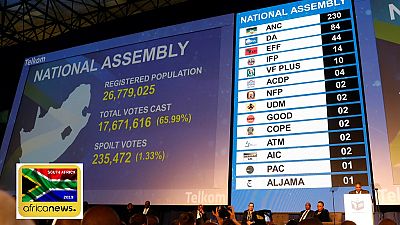

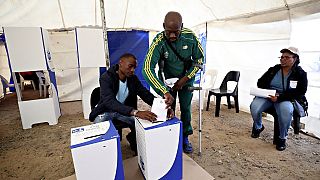
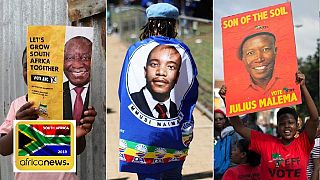
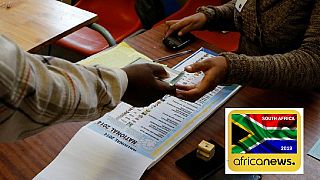

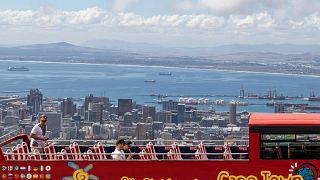
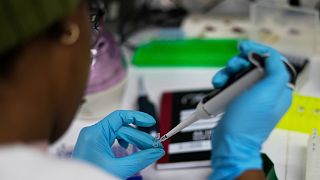


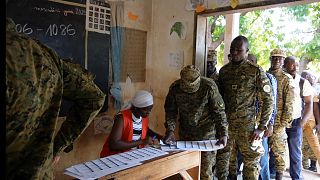
01:52
Togo’s security forces cast early votes ahead of high-stakes municipal elections
02:23
Cameroon: Mixed reactions in Yaoundé after Biya announces bid for another term
Go to video
Semenya ruling shakes foundations of gender rules in sport
01:53
SMES under pressure as business confidence hits four-year low in South Africa
Go to video
Togo protest crackdown raises fears of worsening political crisis
Go to video
Tunisia sentences prominent opposition leader to 14 years in prison